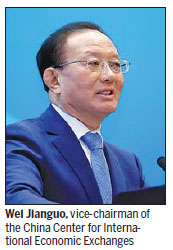China's think tanks 'must be one step ahead'
Expert calls for more long-range thinking in nation's researchers
Despite a long history, Chinese think tanks have failed to meet the demands of the nation's decision-makers today, said Wei Jianguo, vice-chairman of the China Center for International Economic Exchanges.
He called for more professional, dedicated studies based on China's actual conditions. The CCIEE, a government think tank, is the host of the two-day Global Think Tank Summit starting on Friday in Beijing.
He said the earliest think tanks in China date back to more than 2,000 years ago when ancient noblemen usually had groups of advisers serving them. These days, few Chinese think tanks wield global influence, although the total number of think tanks in China ranks second worldwide only after the United States.
"Most of China's think tanks tend to study short-term issues instead of doing foresighted research, and lack independent thinking," said Wei, adding that they need to improve their level of organization and management of human resources.
"They focus too much on interpreting policies," said Wei. "It is indeed necessary, but the point of having think tanks is to let them generate new ideas to help the government make decisions. They must be one step ahead of the government.
"Think tanks must offer solutions to the government. They must be clever moves, like the Trans-Pacific Partnership agreement that helped the US 'return' to the Asia-Pacific region by creating a new economic organization outside the WTO.
"Also, they will give explanations to the people to reduce misunderstanding. When China was accused of 'neocolonialism' in Africa, the CCIEE released reports and held seminars to prove the charges were fabricated and hyped.
"Thirdly, they should provide direction to companies, helping them make development plans and decisions."
Wei suggested Chinese think tanks consider the complex conditions in China before conducting any research.
"We should not copy the models of Western think tanks, but we can learn from them to determine how to conduct independent research and produce high-quality insight.
"The idea of sharing will change the future world," he said.
The think tank summit involves global think tanks representing various parties, allowing them to share and exchange views to achieve winwin benefits, he said.
The CCIEE conducts economic exchanges domestically and internationally to promote economic cooperation.
It has proposed many ideas that have been accepted by the Chinese government, such as the Asian Infrastructure Investment Bank, interconnectivity among Asian nations and reforms of China's State-owned enterprises.
Wei said that CCIEE researchers have integrated global vision with Chinese ways of thinking, and are actively engaged in foresighted subjects.
According to a report about the influence of Chinese think tanks unveiled by the Shanghai Academy of Social Sciences in January, the CCIEE ranked among the leaders on many lists.
Wei explained their rankings are a result of their high exposure rate and the adoption rate of their research.
He added that China is embracing "the era of think tanks" as the Chinese government attaches great importance to the development of domestic think tanks, expecting them to help the government make decisions "democratically, scientifically and diversely".
zhangzhao@chinadaily.com.cn

(China Daily 06/26/2015 page15)














